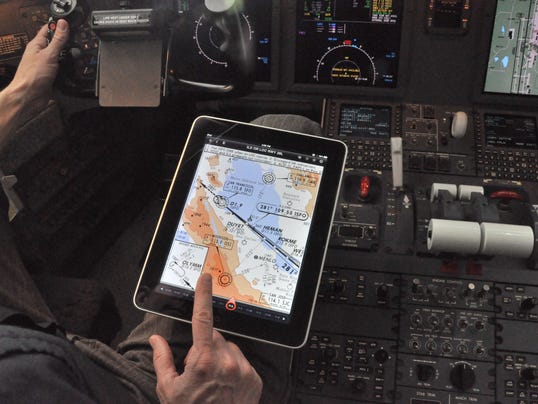Bart Jansen, USA TODAY 10:10 a.m. EDT October 31, 2013

Pilots at some airlines already use iPads in the cockpit, to reduce the amount of paperwork they carry. The Federal Aviation Administration proposal would also wide use among passengers.(Photo: Jeppesen)
[h=3]Story Highlights[/h]
Airline passengers will be able to use electronics such as readers and games from throughout flights, the Federal Aviation Administration announced Thursday.
Passengers should continue to check with airlines before using their smartphones, tablets or e-readers. Connecting to the Internet remains prohibited when the plane is less than 10,000 feet in the air.
Voice calls also remain prohibited during the entire flight, under a Federal Communications Commission rule.
Because of differences in equipment among airlines and aircraft, it will take some time for airlines to prove they can fly safely with gadgets on. But the FAA expects gadgets to be widely allowed by the end of the year.
"We believe today's decision honors both our commitment to safety and consumers' increasing desire to use their electronic devices during all phases of flight," Transportation Secretary Anthony Foxx said.
Thursday's decision marks a major change for passengers eager to keep reading an electronic book, listen to music or play a game while the plane is less than 10,000 feet in the air, where those activities have been prohibited.
The decision on other gadgets follows a report Sept. 30 from a 28-member committee representing airlines, manufacturers, electronics makers, pilots and flight attendants.
The prohibition against electronics began decades ago because of concerns about interference with cockpit communications and navigation equipment. But passengers have sought easier use of their gadgets as electronics become more widespread and as aircraft equipment has become less susceptible to stray signals.
Consumer groups and lawmakers such as Sen. Claire McCaskill, D-Mo., have argued that electronic readers are no more dangerous than books during takeoff and landing.


Pilots at some airlines already use iPads in the cockpit, to reduce the amount of paperwork they carry. The Federal Aviation Administration proposal would also wide use among passengers.(Photo: Jeppesen)
[h=3]Story Highlights[/h]
- Passengers can begin using electronic devices when planes are below 10,000 feet in elevation
- FAA's move comes as wildly popular devices spread worldwide
- Vocie calls, connecting to Internet remain prohibited
Airline passengers will be able to use electronics such as readers and games from throughout flights, the Federal Aviation Administration announced Thursday.
Passengers should continue to check with airlines before using their smartphones, tablets or e-readers. Connecting to the Internet remains prohibited when the plane is less than 10,000 feet in the air.
Voice calls also remain prohibited during the entire flight, under a Federal Communications Commission rule.
Because of differences in equipment among airlines and aircraft, it will take some time for airlines to prove they can fly safely with gadgets on. But the FAA expects gadgets to be widely allowed by the end of the year.
"We believe today's decision honors both our commitment to safety and consumers' increasing desire to use their electronic devices during all phases of flight," Transportation Secretary Anthony Foxx said.
Thursday's decision marks a major change for passengers eager to keep reading an electronic book, listen to music or play a game while the plane is less than 10,000 feet in the air, where those activities have been prohibited.
The decision on other gadgets follows a report Sept. 30 from a 28-member committee representing airlines, manufacturers, electronics makers, pilots and flight attendants.
The prohibition against electronics began decades ago because of concerns about interference with cockpit communications and navigation equipment. But passengers have sought easier use of their gadgets as electronics become more widespread and as aircraft equipment has become less susceptible to stray signals.
Consumer groups and lawmakers such as Sen. Claire McCaskill, D-Mo., have argued that electronic readers are no more dangerous than books during takeoff and landing.
